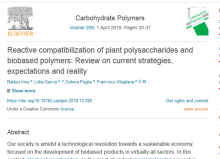Table of Contents
- BARBARA project special session in the 7th International Conference on Biobased and Biodegradable polymers. BIOPOL 2019
- University of Alicante and FECOAM have participated in the Murcia Food Brokerage Event 2019
- BARBARA project in GreenWin International Conferences: Green Chemistry - White Biotechnology
- The first article related to the project is published in form of a review in "Carbohydrate Polymers"
BARBARA project special session in the 7th International Conference on Biobased and Biodegradable polymers. BIOPOL 2019
Date: Monday, 17 June, 2019 to Wednesday, 19 June, 2019
BARBARA project was presented in a complete special session during the 7th International Conference on Biobased and Biodegradable Polymers, BIOPOL-2019 in Stockholm. A keynote lecture presented by Prof. María del Carmen Garrigós (University of Alicante) was kindly invited by the conference organisers, while 3 oral communications related to the project were also presented by KTH, UNIPG and TECNOPACKAGING. BARBARA project was also presented to the 290 delegates in the conference by hosting a stand where samples prepared by additive manufacturing with the BARBARA biopolymers and natural additives were shown as well as the new BARBARA project leaflet, a box to let contacts to receive more information of the project and the newsletter subscription request. The BARBARA project stand was next to the Conference sponsors stands, the conference rooms and the coffee break tent ensuring the good visibility of our project to all the conference participants.
On Tuesday (18th) afternoon the BARBARA project special session started with a Keynote Invited Lecture by Maria del Carmen Garrigós from University of Alicante entitled “Agro-food waste valorisation as a source of value biochemical towards a circular economy”. Then the session continued with the following talks:
- Balazs Irme from KTH: “Organocatalytic esterification of corn starch for materials applications”
- Luigi Torre from University of Perugia: “Polyester-based biocomposites with enhanced properties by using natural additives obtained from agrofood wastes”
- Lidia García form TECNOPACKAGING: “Filament development for 3D printing based on BARBARA biocomposites”.
At the room entrance our staff gave the audience the new leaflets prepared for this effect and many conference participants showed their interest in the project and the oral presentations held in this special session.
We would like to thank all the organising committee of the BIOPOL conference by their kind invitation to present our project in such an important conference as well as by their great job in making the conference and the BARBARA project special session running smoothly.
Pictures and comments of the special session were published in real time by the Twitter application of our project. At the end of the BIOPOL-2019 conference the #BARBARA_BIOPOL19 publications reached 4045 impressions!!
Some pictures from the BIOPOL19 conference and particularly of the BARBARA project stand and special session are shown here. Do not forget to subscribe to our newsletter and follow us on Twitter, Facebook, LinkedIn and YouTube.
Location: KTH Royal Institute of Technology SE-100 44 Stockholm
Country: Sweden
City: Stockholm
University of Alicante and FECOAM have participated in the Murcia Food Brokerage Event 2019 which took place in Murcia (Spain) with more than 400 participants and where the BARBARA project was presented to different companies involved in the areas of food, agriculture and food packaging, as well as to delegates from different universities and research centers (https://murciafood2019.b2match.io).
UA participated in more than 15 individual interviews with companies who showed their high interest in the results of the BARBARA Project, while FECOAM contacted with farmers and other companies related to the agricultural sector.
These activities will be continued in the future in sectorial Brokerage Events to disseminate BARBARA project in different strategical sectors.
BARBARA project in GreenWin International Conferences: Green Chemistry - White Biotechnology
Date: Wednesday, 8 May, 2019
Last 8th-9th May the 5th Edition of the “GreenWin International Conferences: Green Chemistry - White Biotechnology” took place at the Gosselies Point Centre (Brussels South Airport business park), under the auspices of Université Libre de Bruxelles - ULB (Brussels Free University) (see http://event.greenwin.be/en/event/consult/20 ). One of the objectives of the presentation of the BARBARA project in that conference was to show the link between the research results obtained over the project and the market interests.
The purpose of this series of conferences is to take stock of the innovative technology used to boost activities in the fields of green chemistry and white biotechnology around the world, to share knowledge and encourage the creation of new R&D projects involving the academic world, research centres and industrial players in the sector at regional and international scale. CELABOR presented the BARBARA project to many companies and research centers which showed their interest in the project. Do not forget to subscribe to our newsletter to keep informed about all our project news! Subscribe to our newsletter. Also, follow us on Twitter, Facebook and Youtube.
As the project progresses, members from KTH, UNIPG and TECNOPACKAGING have recently published a review article on the prestigious journal "Carbohydrate Polymers", dealing with the compatibilization of polysaccharides and bio based polymers obtained from natural sources. This review critically explores the current status and the future outlook of reactive compatibilization strategies of the most common plant polysaccharides in blends with bio-based polymers.
The chemical processes for the modification and compatibilization of starch and lignocellulosic based materials is discussed, together with the practical implementation of these reactive compatibilization strategies with special emphasis on reactive extrusion. This review is directly related with the main topic of the BARBARA project, revealing the original hurdles to tackle within the project. Congrats to all the coauthors for a great job together! If you are interested in reading further on this work, access here.
Be updated on the latest news on the Barbara Project, the valorisation of agrowaste and 3D-printing on our social media networks or subscribe to our newsletter and our youtube channel.
Follow us on facebook, twitter and linkedin!!

